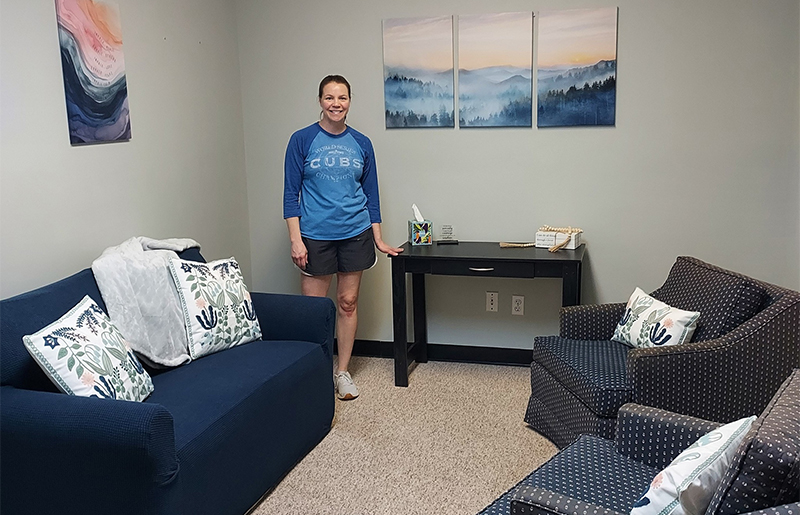
Cy-Fair Helping Hands Expands Mission with 'Talk It Out' Mental Health Counseling for Healing and Hope
When Cy-Fair Helping Hands (CFHH) first began, it was one woman’s heart, a pot of soup, and a pickup truck. Jean and John Dreyer’s personal mission to feed and support people experiencing homelessness grew into a community-driven nonprofit serving fourteen ZIP codes within the Cy-Fair ISD boundaries. Over time, CFHH expanded its offerings to include a Community Food Pantry, transitional family services, homeless outreach, scholarships, and more.
Now, CFHH has taken a step further with a new initiative called “Talk It Out”—a free mental health counseling program designed to meet people where they are, emotionally as well as physically.
Meeting Emotional Needs in a Compassionate Space
Jean Dreyer, Co-Founder and Chairman of the Board for CFHH, said the new program is a natural extension of their mission. She explained that “Talk It Out” was designed to offer accessible, empathetic support to the community, reflecting CFHH’s long-standing focus on dignity, hospitality, and mental health awareness. From its early days of meeting physical needs with a pot of soup to now addressing emotional needs through counseling, the organization continues to evolve to meet people where they are. “It’s about creating a safe space for people to share their struggles and find guidance,” Dreyer said.
The decision to add counseling came from a deeper understanding of how emotional health and basic needs are intertwined. “We’ve always believed that true compassion addresses the whole person,” Dreyer said. “While food, shelter, and clothing meet urgent physical needs, we’ve seen firsthand how emotional wounds—grief, trauma, anxiety, isolation—can quietly undermine a person’s ability to heal, rebuild, and thrive."
According to Dreye, the “Talk It Out” program was thoughtfully created in response to this recognition, expanding CFHH’s mission to include emotional as well as physical support.
A Growing Need in Cy-Fair
CFHH serves a diverse population, including individuals and families experiencing homelessness, those facing food insecurity, and students in need of support. The organization has observed a noticeable rise in emotional strain, often hidden beneath day-to-day survival efforts, particularly among those navigating trauma, instability, or isolation. While the Cy-Fair community is known for its resilience, CFHH recognizes that resilience does not erase the pain many residents carry.
The “Talk It Out” program was developed with the goal of removing barriers to emotional support and offering a welcoming environment for those in need “This initiative offers a safe and stigma-free space for individuals to process their struggles and begin the healing process,” Dreyer said.
Mobile Sidebar Ad
These needs are backed by national data. According to the Substance Abuse and Mental Health Services Administration (SAMHSA), approximately 30% of people experiencing chronic homelessness have a serious mental health condition, and about half live with co-occurring substance use disorders. The National Institute of Mental Health (NIMH) also reports that nearly one in four adults with severe mental illness has experienced homelessness at some point in their lives. Without access to mental health care, cycles of instability can persist.
Healing as a Path to Stability
Many who come to CFHH carry trauma from instability or deep personal loss, which can erode self-worth and make even small steps toward stability feel overwhelming. Through counseling, individuals are given tools to manage stress, rebuild relationships, and set goals—key steps that can move them from crisis toward clarity, employment, housing, and renewed purpose.
Dreyer said the heart of the program is about creating an environment where people feel empowered to heal: “By offering free counseling through ‘Talk It Out,’ we’re helping individuals reclaim their sense of self-worth and believe that change is possible.”
By pairing emotional support with practical resources, integration becomes key to the program’s success. Connecting “Talk It Out” with CFHH’s broader services—including case management, housing support, and resource navigation—helps clients move forward with both emotional and practical support, building a stronger foundation for lasting self-sufficiency.
Breaking the Stigma
The program also aims to combat stigma surrounding mental health by showing that emotional support is not a luxury but a lifeline. Designed to meet people where they are—without judgment or pretense—“Talk It Out” offers counseling in the same welcoming environment where clients already receive food, clothing, and housing support, sending a powerful message that mental health matters and every individual is worthy of care.
“We want every client to know that emotional support isn’t a luxury—it’s a lifeline,” Dreyer said.
Clients have already responded positively, expressing curiosity, relief, and even surprise that counseling is available in a trusted environment they already know. This early engagement is sparking conversations about mental and emotional health that many had never felt safe enough to have before.
“The response has been deeply encouraging,” Dreyer said.
Mobile Sidebar Ad
Volunteers with Expertise and Heart
Licensed mental health professionals are volunteering their expertise to power “Talk It Out,” providing trauma-informed insight and compassionate care that address not just immediate needs but also the often-invisible emotional wounds clients carry. Their skills and willingness to serve ensure that emotional and psychological safety are prioritized alongside food and shelter.
“Their presence signals that emotional and psychological safety are just as vital as food and shelter,” Dreyer said.
The counseling space itself was intentionally designed by Katie, a licensed social worker and certified trauma professional, to create an environment that feels welcoming and safe. Her approach focused on privacy, warmth, and comfort, offering a setting that feels more like a refuge than an office.
“Katie brought more than credentials to the ‘Talk It Out’ space—she brought vision, discernment, and a deep understanding of what trauma-informed care really looks like in practice,” said Dreyer.
A Vision for the Future
Currently, two therapists staff “Talk It Out,” and additional professionals have already expressed interest in joining. CFHH intends to grow the team carefully to preserve the intimacy and trust that make the program unique, focusing on professionals who share its values and are committed to serving with both expertise and heart.
“We’re not rushing—we want this team to grow in a way that preserves the intimacy and trust that make ‘Talk It Out’ so special,” Dreyer said.
Success for the program will be measured by more than numbers. While CFHH will track session counts and client feedback, it will also pay close attention to personal outcomes, such as individuals feeling heard for the first time, finding clarity during a crisis, or learning to trust again after hardship.
“In six months or a year, we hope to see more clients engaging with the service, but more importantly, we want those interactions to be meaningful, affirming, and transformative,” said Dreyer.
A Call to Those Who Are Hurting
Dreyer shared a heartfelt message for anyone struggling: “If you’re struggling with anxiety, depression, or loneliness, please hear this: You are not alone. We see you. We care about you. And we are here to help. You don’t have to carry it all by yourself. You are worthy of support. You are not a burden. And healing is possible. Reach out when you’re ready. We’ll be here.”
Mobile Sidebar Ad
Community Support Makes It Possible
“Talk It Out” is entirely volunteer-driven at this stage, relying on the generosity of licensed counselors who donate their time and expertise. Additional support and funding would allow the program to expand its number of sessions, reaching even more people in need.
“If we could compensate our counselors, we could easily expand the number of sessions offered—meeting more needs, more often,” Dreyer said.
Residents who want to help can volunteer, donate, or simply spread the word. More information is available at cyfairhelpinghands.org or by contacting Executive Director Janet Ryan at janet@cyfairhelpinghands.org.
With “Talk It Out,” Cy-Fair Helping Hands is strengthening its commitment to healing—not just bodies and homes, but hearts and minds.
Stay tuned with My Neighborhood News for updates on this program and other initiatives bringing hope to the Cy-Fair community.
 Tiffany Krenek has been on the My Neighborhood News team since August 2021. She is passionate about curating and sharing content that enriches the lives of our readers in a personal, meaningful way. A loving mother and wife, Tiffany and her family live in the West Houston/Cypress region.
Tiffany Krenek has been on the My Neighborhood News team since August 2021. She is passionate about curating and sharing content that enriches the lives of our readers in a personal, meaningful way. A loving mother and wife, Tiffany and her family live in the West Houston/Cypress region.

